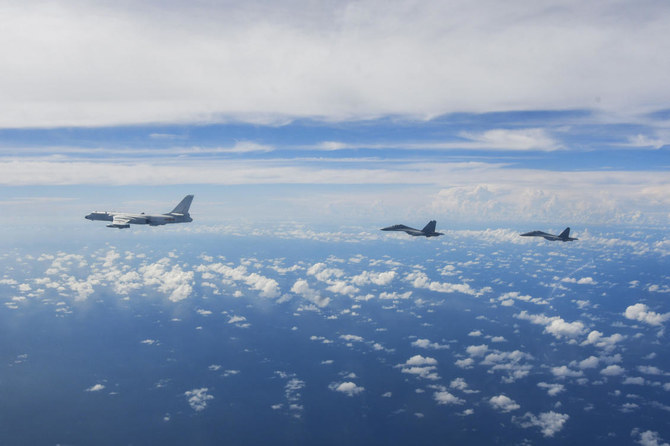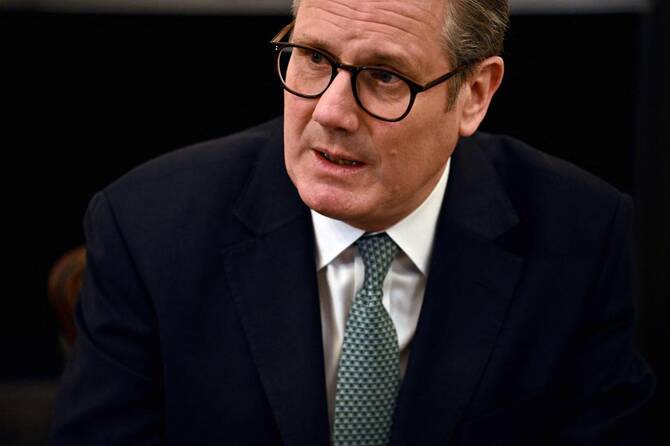BEIJING: China said Monday it had organized fresh military drills around Taiwan, as a delegation of visiting United States lawmakers met the island’s leader after a similar trip by House Speaker Nancy Pelosi heightened fears of conflict.
The unannounced two-day trip came after Beijing sent warships, missiles and jets into the waters and skies around Taiwan, a self-ruled democracy that China’s leaders claim and have vowed to one day seize.
The five-member congressional delegation — led by Senator Ed Markey of Massachusetts — met with President Tsai Ing-wen on Monday, according to Washington’s de facto embassy.
“The delegation had an opportunity to exchange views with Taiwan counterparts on a wide range of issues of importance to both the United States and Taiwan,” it said.
The bipartisan trip sparked a caustic response from Beijing, which said it had carried out “combat readiness patrol and combat drills in the sea and airspace around Taiwan island” on Monday.
“This is a solemn deterrent against the US and Taiwan for continuing to play political tricks and undermining peace and stability across the Taiwan Strait,” Shi Yi, spokesman for the Chinese military’s Eastern Theater Command, said in a statement, promising to “resolutely defend national sovereignty.”
Taiwan’s government has accused Beijing of using Pelosi’s visit as an excuse to kickstart drills that would allow it to rehearse for an invasion.
China’s Communist Party has never ruled Taiwan but says it will use force if necessary to take the island and bristles at any perceived treatment of it as a sovereign nation state.
In response to the delegation’s visit, Beijing called on Washington to “stop going further down the wrong path of hollowing out and distorting the one-China principle, so as not to cause further damage to China-US relations and peace and stability in the Taiwan Strait.”
“China will take firm and forceful measures to safeguard its national sovereignty and territorial integrity,” foreign ministry spokesman Wang Wenbin told a regular briefing.
That decades-old threat was reiterated in a white paper published last week when China’s Taiwan Affairs Office said it would “not renounce the use of force” against its neighbor and reserved “the option of taking all necessary measures.”
It added, however: “We will only be forced to take drastic measures to respond to the provocation of separatist elements or external forces should they ever cross our red lines.”
Taipei has remained defiant throughout the standoff with Beijing, with foreign minister Joseph Wu saying after a meeting with the delegation that their visit showed the island had not been cowed by China’s threats.
“Authoritarian China can’t dictate how democratic Taiwan makes friends, wins support, stays resilient and shines like a beacon of freedom,” Wu said in a tweet.
“Their visit once again demonstrates that China cannot dictate nor instruct other countries’ politicians not to visit Taiwan,” Lo Chih-cheng, a lawmaker with the ruling Democratic Progressive Party (DPP), said.
Pelosi has stood by her visit but President Joe Biden said the US military was opposed to the trip by his fellow Democrat, who is second in line to the presidency after the vice president.
Congress is constitutionally an equal branch of government in the United States, with lawmakers free to travel where they wish, and Taiwan enjoys bipartisan backing in divided Washington.
The United States switched diplomatic relations from Taipei to Beijing in 1979. But it remains a key ally of Taiwan and maintains de facto diplomatic relations with Taipei.
Washington’s official policy opposes both Taiwan declaring independence and China forcibly changing the island’s status.
It remains deliberately ambiguous about whether it would come to Taiwan’s aid militarily if China invaded.
Visits by senior US officials to Taiwan have happened for decades and even Pelosi’s trip was not without precedent — then-speaker of the House of Representatives Newt Gingrich visited in 1997.
But the frequency and profile of US visits has increased both under former president Donald Trump and Biden.
Taiwan has also seen a flurry of delegations visit from Europe and other Western allies in recent years, partly in response to Beijing’s more aggressive stance under Chinese President Xi Jinping.


























